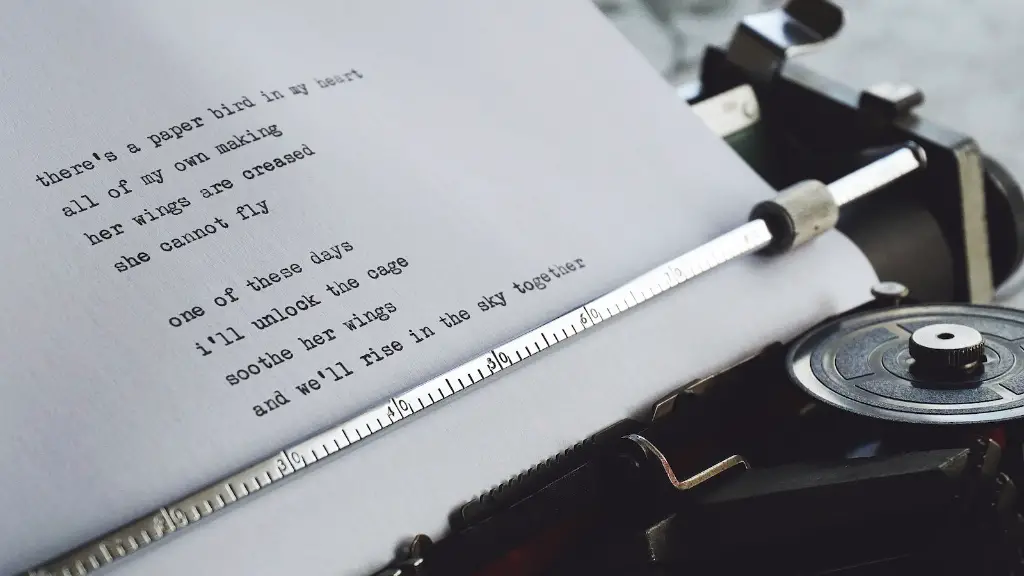What Is Free Verse Poetry?
Free verse poetry is a form of writing that offers freedom to the poet. Unlike traditional poetry, it does not require a strict structure, rhyme or specific rhythm, or any particular form. This offers the poet a breadth of creative freedom, allowing them to express their thoughts, emotions, memories and experiences in a unique and individualized manner.
Free verse poetry has existed since the late 19th century, but did not become more popular until the 20th century. Commonly associated with modernist movements such as Imagism and Dadaism, free verse poetry was seen as a stylistic break away from the traditional models of poetry. Authors like Ezra Pound, T.S. Eliot and William Carlos Williams are often credited with establishing the more popular movement of free verse poetry.
At its core, free verse poetry is a way for the author to write without restriction, letting the poem flow without having to constrain themselves to metrical or stanzaic structure. This gives the poet the ability to experiment and mix line lengths, syntax, language, tone and content in ways that may be impossible or difficult using other forms. To the poet, this translates into a chance to reach a broader audience and express thoughts or ideas that may not be reachable using other forms of writing.
At the same time, despite their freedom, free verse poets are still expected to use poetic language and craft to create eloquent lines. The goal is to often reach a certain emotion or achieve a specific effect. Through their lack of structure, free verse poets can express just about anything they want, in whatever tone and language they desire, making it a powerful vehicle for modern poetry.
In the eyes of some literary critics, free verse poetry has emerged as an important part of the canon, with its acceptance growing over time. This acceptance has also come with new challenges, as poets often find themselves being held to a higher standard of craftsmanship and creativity despite the lack of censorship common in other forms of writing.
With the current cultural movement toward more creativity and freedom in the arts, free verse poetry is enjoying a surge of popularity. And unlike its traditional form, free verse poets often don’t need to concern themselves with getting published or following any other guidelines. This gives free verse poets freedom to write for their own sake, allowing them to express ideas and thoughts that may otherwise have gone unheard.
What Sets Free Verse Poetry Apart?
One of the most striking features of free verse poetry is its lack of formal structure, which allows poets to explore new forms while at the same time eliminating the need to follow any pre-defined conventions. This can often lend the poem a feeling of utter freedom, as the poet is no longer constricted by any form. Instead of following a traditional structure, the poet can experiment with spacing, punctuation and other factors that give the poem its own unique identity.
Free verse poetry is also often associated with experimental forms, such as concrete and found poetry. These forms are known for their use of unconventional words and ideas, often giving the poem a sense of whimsy and uniqueness. This offers poets the chance to explore their creativity, often leading to unique and unique results.
What’s more, free verse poets are often encouraged to experiment with different styles and techniques to create their own unique sound. This often gives the poem an added layer of complexity, as the reader is presented with an array of poetic lexicon. This can add to the overall feeling of the poem, creating an experience that is both pleasing and interesting.
And unlike its more traditional forms, there is no finite structure or rhythm to free verse poetry. This allows the poet to explore different forms and ideas, often leading to a more personal and introspective work. This can be beneficial to both poet and reader, as it allows the poet to communicate their ideas in a more personal manner and enables the reader to better understand the poet’s thoughts and feelings.
Finally, free verse poetry has seen a surge of popularity in the modern era. This popularity has been accompanied by an increased demand for new voices and new forms. This is particularly beneficial to the poet, as it provides them with a wider platform on which to express themselves.
The Mechanics Of Free Verse Poetry
The mechanics of free verse poetry can often be quite different from those of traditional poetry. While traditional poetry is often focused on the organization of words, free verse poetry allows a certain degree of freedom in the ordering of words. This is particularly beneficial to poets who may have difficulty expressing their thoughts in traditional poetry.
At its root, free verse poetry has no set of technical rules. Poets can choose to follow any structure they like, as long as it does not hinder the poem’s overall meaning and flow. This adds a certain level of creativity to the process, as poets are free to explore and experiment with their writing in ways that may be possible with other forms of verse.
In terms of content, free verse poets often focus on more emotive topics. That being said, they often explore themes that may otherwise be too abstract or difficult to express using other forms of written language. They may also mix styles and forms, often giving the poem a unique flavor that can be missing from more traditional forms of poetry.
The lack of structure in free verse poetry often allows poets to approach the poem from different angles. They may focus on one particular idea or theme, or they may use the poem to explore different topics and perspectives. This can often lead to more interesting and complex works of art, as the poet is not constricted by any particular structure or form.
The Benefits Of Writing Free Verse Poetry
Free verse poetry may not have a strict form or structure, but it does have a certain level of freedom. This offers poets an opportunity to explore different concepts, styles and points of view in more creative and unique ways. Writing free verse poetry may be more challenging than other forms of poetic writing, but it can be just as rewarding.
The lack of structure and rules also allows poets to experiment with different elements of language and craft without having to adhere to any particular style or format. This can often lead to more emotionally powerful work, as poets can often express their thoughts and ideas in ways that may be impossible or difficult with traditional forms of writing.
Finally, free verse poetry often comes with fewer restrictions and layers of obscurity. This allows poets to more freely and openly express their feelings, thoughts and ideas. The lack of censorship can often lead to more honest and sincere works of art, which can be both meaningful and powerful in their own right.
What Do Literary Critics Think Of Free Verse Poetry?
Free verse poetry has grown in popularity over the last few decades, and many literary critics now consider it to be a legitimate form of writing. While some may still view its lack of structure as a negative factor, many see the form’s openness and creativity as a positive attribute. This is seen in the increasing acceptance of free verse poets by literary critics, editors and readers alike.
At the same time, there are still some who view free verse poetry as a way for poets to slack off and use it as an excuse for sloppy craftsmanship. These critics often cite the lack of structure and form as a hindrance, pointing to its perceived lack of technical proficiency.
Nonetheless, free verse poetry has its admirers, including many noted authors and poets. These admirers often view the form as an important part of today’s literary canon, and many have even begun to embrace the form and its unique qualities, advocating for its acceptance.
In short, free verse poetry can be a powerful and rewarding form of writing. Though it may not have the same traditional beauty or structure as other forms of writing, it offers writers the freedom to explore and express themselves without the restrictions of traditional verse.
The Influence Of Free Verse Poetry
Free verse poetry is often seen as a form of rebellion against traditional verse structure and form. This perception has been reinforced by the modern cultural movement towards more freedom and creativity in the arts. This has had an influence on many poets, who have embraced the form as a way of expressing themselves in an unconstrained and unique way.
Free verse poetry has also allowed for the emergence of new voices, both from within and outside of traditional literary circles. This has opened up new platforms for poets to share their experiences, thoughts and feelings in ways that may not have been possible before. In this way, free verse has come to represent a more inclusive form of writing, one that allows writers of all backgrounds and identities to be heard.
Finally, the influence of free verse poetry has extended beyond the classroom and into popular culture. Many modern musicians, artists and writers have embraced the form, using it as a vehicle for their own unique ideas and expressions. This has opened up new avenues for modern poetry, allowing writers to reach a broader and more expansive audience.
Conclusion
Free verse poetry can be a powerful form of writing. Its lack of structure and sense of freedom allows poets to explore their creativity in ways that may be impossible or difficult in other forms. At the same time, its popularity has seen an increased demand for new voices and ideas, opening up entirely new platforms for both poets and readers. This has increased the form’s acceptance and has made it a legitimate part of the literary canon, establishing it as a powerful force in modern poetry.





